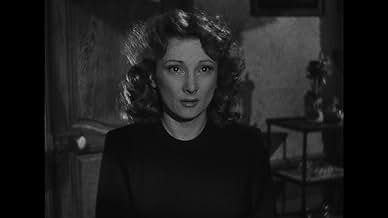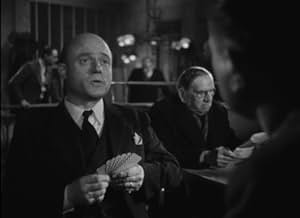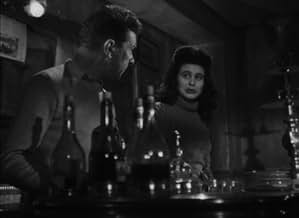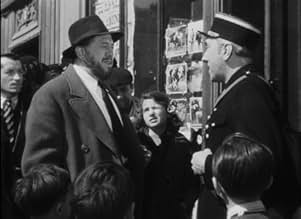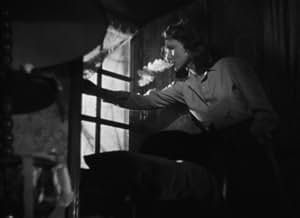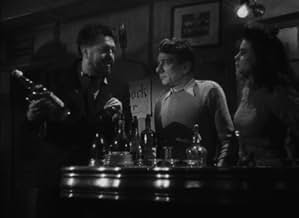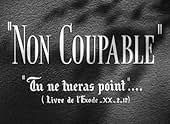Aggiungi una trama nella tua linguaAn alcoholic doctor accidentally kills someone and manages to make the death look like an accident. The episode triggers a sense of confidence and he resolves to correct the miseries of his ... Leggi tuttoAn alcoholic doctor accidentally kills someone and manages to make the death look like an accident. The episode triggers a sense of confidence and he resolves to correct the miseries of his life.An alcoholic doctor accidentally kills someone and manages to make the death look like an accident. The episode triggers a sense of confidence and he resolves to correct the miseries of his life.
Georges Bréhat
- Aubignac
- (as Georges Brehat)
Henri Charrett
- L'inspecteur Noël
- (as Charrett)
François Joux
- Le lieutenant Louvet
- (as Francois Joux)
Charles Vissières
- L'antiquaire
- (as Vissiere)
Emile Chopitel
- Tournier
- (as Chopitel)
Ariane Murator
- Madame Bastard, la mère de la petite malade
- (as Ariane Muratore)
Jean Sylvère
- Un ami du Docteur Ancelin
- (non citato nei titoli originali)
Recensioni in evidenza
Michel Simon is a drunk doctor with a declining practice. One evening, driving home from a dive bar, he strikes and kills a motorcyclist. Thinking fast and clearly, he makes it look like the motorcyclist had an accident. When he gets away with it, he congratulates himself on his brilliant thinking, and goes back to tending his patients with the best skill he has.
Then he discovers his mistress, Jany Holt, has been cheating on him and selling his gifts to her to give to her lover.
If you want someone to play a pitiable monster, you could not do better than Simon, and that's what director Henri Decoin has done here. He keeps his camera on Simon, surrounds him with intelligible and not particularly memorable characters -- with the exception of Jean Wall, who plays the doctor who is stealing away Simon's practice as a cold, arrogant character -- and lets Simon stand out, as he simultaneously exults in his triumphs and finds despair in the destruction of the ideals he once held.
Then he discovers his mistress, Jany Holt, has been cheating on him and selling his gifts to her to give to her lover.
If you want someone to play a pitiable monster, you could not do better than Simon, and that's what director Henri Decoin has done here. He keeps his camera on Simon, surrounds him with intelligible and not particularly memorable characters -- with the exception of Jean Wall, who plays the doctor who is stealing away Simon's practice as a cold, arrogant character -- and lets Simon stand out, as he simultaneously exults in his triumphs and finds despair in the destruction of the ideals he once held.
The description of a small town, a doctor whose life is mediocre, committed an deadly accident and begins to think about the perfect crime. The balack and white helps us to feel this dark story.
A very brillant performance of Michel Simon, one of the greatest actors of the beginning of the last century.
A very brillant performance of Michel Simon, one of the greatest actors of the beginning of the last century.
Most people in the town, and all of its circle of important men, see Dr Ancelin as a failure like Charles Bovary: a hopeless, provincial drudge who works twice as hard to achieve half as much. But Ancelin has no Emma at his side (indeed, he terrifies his mistress Madeline, who is also cheating on him). He relies on alcohol and self-pity to get through the day as he sinks ever lower in the esteem of most of his neighbors, and perhaps himself. A fatal accident caused by the inebriated doctor provides the catalyst for the film's plot, in the course of which the good doctor tries to rehabilitate himself, at least in his own eyes, by a series of murders.
The view of life and human nature is about as bleak as it gets. Michel Simon embodies Ancelin's unpredictable violence and loathing, both for himself and just about everyone around him. His style of acting, looser and more uninhibited, contrasts with the classical style of the rest of the cast and makes the point even more forcefully.
Like Henri-Georges Clouzot, Henri Decoin directed films in France during the occupation (though, unlike Clouzot, he was not prohibited from directing after the war). Films like Clouzot's 'The Raven' ('Le corbeau') and Decoin's 'Non coupable' explore the realities of life under occupation decades before France would begin to deal with them publicly. Things that try to stay hidden have a terrible cost.
The view of life and human nature is about as bleak as it gets. Michel Simon embodies Ancelin's unpredictable violence and loathing, both for himself and just about everyone around him. His style of acting, looser and more uninhibited, contrasts with the classical style of the rest of the cast and makes the point even more forcefully.
Like Henri-Georges Clouzot, Henri Decoin directed films in France during the occupation (though, unlike Clouzot, he was not prohibited from directing after the war). Films like Clouzot's 'The Raven' ('Le corbeau') and Decoin's 'Non coupable' explore the realities of life under occupation decades before France would begin to deal with them publicly. Things that try to stay hidden have a terrible cost.
Another movie which i expected it was gonna be good, but it turned out to be even better.
First of all, i don't necessarily agree with some viewers that it's a black comedy. At times, it plays out like that but overall, it is a psychological drama thriller, a tragedy -not in an Ancient Greek sense but more like Edgar Allan Poe maybe. If i had to find something in common with Ancient Greek tragedies, it's the way the protagonist thinks he/she avoided "the spider" (their fate) but with every step they take, they are entangled even more in the web.
Michel Simon is expectedly magnificent, Jany Holt the same. The whole movie feels "fresh", timeless and not dated at all. It's both entertaining and deep. Exciting and intense.
And the ending was great. Even if you can guess where it goes, it's still awe-inspiring.
First of all, i don't necessarily agree with some viewers that it's a black comedy. At times, it plays out like that but overall, it is a psychological drama thriller, a tragedy -not in an Ancient Greek sense but more like Edgar Allan Poe maybe. If i had to find something in common with Ancient Greek tragedies, it's the way the protagonist thinks he/she avoided "the spider" (their fate) but with every step they take, they are entangled even more in the web.
Michel Simon is expectedly magnificent, Jany Holt the same. The whole movie feels "fresh", timeless and not dated at all. It's both entertaining and deep. Exciting and intense.
And the ending was great. Even if you can guess where it goes, it's still awe-inspiring.
With "les inconnus dans la maison" (1942),Henry Decoin, one of the past masters of the French film noir,entered his more fruitful career ;but the trilogy he made before the end of WW2 (which encompass such works as "le bienfaiteur" and "l'homme de Londres ") was not entirely desesperate : some sunshine broke through .
It was no longer that way with "la fille du diable" (1945) ,the ending of which is one of the most pessimistic he ever conceived ;that may explain why "non coupable" has TWO endings :the producers suggested he film another sweetened conclusion* ,like Duvivier reluctantly did for his masterpiece "la belle équipe" (1936);now screened just after the film ,this new denouement brings nothing new and spoils the absolutely noir atmosphere of the movie: probably inspired by Fritz Lang's "woman in the window" (1944), it comes at the most awkward moment.
I suggest the 2021 (soon to be 2022) viewer leave after the director's cut (or turn off his TV set ) for ,as Decoin intended it , it is one of the apex of French film noir and begins where the precedent movie left ; the comparison is not irrelevant :both movies feature an outcast ,Isabelle ,'the Devil's daughter" in the 1945 effort Ancelin in "non coupable" ,a barfly doctor despised by the whole town ,including his colleague ,a smug elegant man who loves to bring him down ;in their scene together ,the words do not cut,they bite.
In both movies ,the press plays a prominent part :the cynical journalist in "non coupable" , Isabelle's cuttings in "la fille du diable".
I dare you to find ONE nice character in "non coupable" ; the crimes may be implausible (one of the main reproaches when the movie was released )but they inspire the director's extremism :based on a Marc -Gilbert Sauvageon 's screenplay ,it depicts the hypocrisy and the wickedness which linger on even when the customers have left the bistro ,leaving the human wreck with the owner and the waitress.
Michel Simon ,one of five greatest actors of the French cinema , gives a superlative performance ,in the part of a man rejected by a whole town (like in Duvivier's masterful "panique"(1945) ). Good support from Jany Holt as his wife and from Jean Wall as honorable doctor Dormont.
. *"les amants sont seuls au monde " (1947) has also another sweetened ending ;producers like happy ends best .
It was no longer that way with "la fille du diable" (1945) ,the ending of which is one of the most pessimistic he ever conceived ;that may explain why "non coupable" has TWO endings :the producers suggested he film another sweetened conclusion* ,like Duvivier reluctantly did for his masterpiece "la belle équipe" (1936);now screened just after the film ,this new denouement brings nothing new and spoils the absolutely noir atmosphere of the movie: probably inspired by Fritz Lang's "woman in the window" (1944), it comes at the most awkward moment.
I suggest the 2021 (soon to be 2022) viewer leave after the director's cut (or turn off his TV set ) for ,as Decoin intended it , it is one of the apex of French film noir and begins where the precedent movie left ; the comparison is not irrelevant :both movies feature an outcast ,Isabelle ,'the Devil's daughter" in the 1945 effort Ancelin in "non coupable" ,a barfly doctor despised by the whole town ,including his colleague ,a smug elegant man who loves to bring him down ;in their scene together ,the words do not cut,they bite.
In both movies ,the press plays a prominent part :the cynical journalist in "non coupable" , Isabelle's cuttings in "la fille du diable".
I dare you to find ONE nice character in "non coupable" ; the crimes may be implausible (one of the main reproaches when the movie was released )but they inspire the director's extremism :based on a Marc -Gilbert Sauvageon 's screenplay ,it depicts the hypocrisy and the wickedness which linger on even when the customers have left the bistro ,leaving the human wreck with the owner and the waitress.
Michel Simon ,one of five greatest actors of the French cinema , gives a superlative performance ,in the part of a man rejected by a whole town (like in Duvivier's masterful "panique"(1945) ). Good support from Jany Holt as his wife and from Jean Wall as honorable doctor Dormont.
. *"les amants sont seuls au monde " (1947) has also another sweetened ending ;producers like happy ends best .
Lo sapevi?
- QuizThe movie has an alternative ending, which is shown after the restored version of the film.
- BlooperThe crime takes place in a village of "Indre et Loire" (newspaper title). However, the big town around, twice quoted, is Chartres, i.e., in "Eure et Loire".
I più visti
Accedi per valutare e creare un elenco di titoli salvati per ottenere consigli personalizzati
Dettagli
- Tempo di esecuzione1 ora 35 minuti
- Colore
- Mix di suoni
- Proporzioni
- 1.37 : 1
Contribuisci a questa pagina
Suggerisci una modifica o aggiungi i contenuti mancanti

Divario superiore
By what name was Condannatemi! (1947) officially released in Canada in English?
Rispondi
